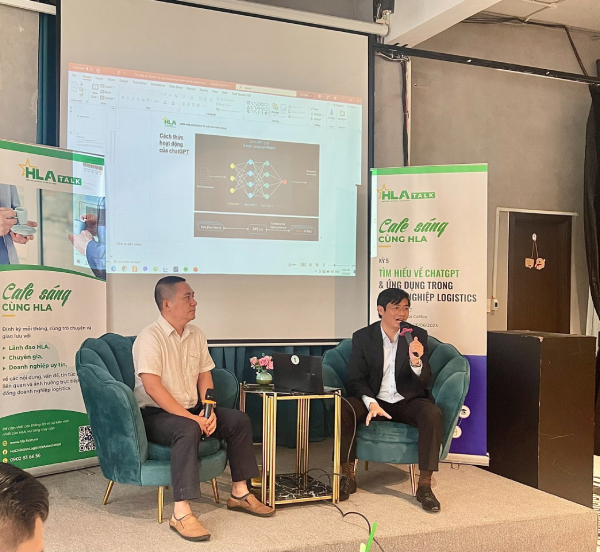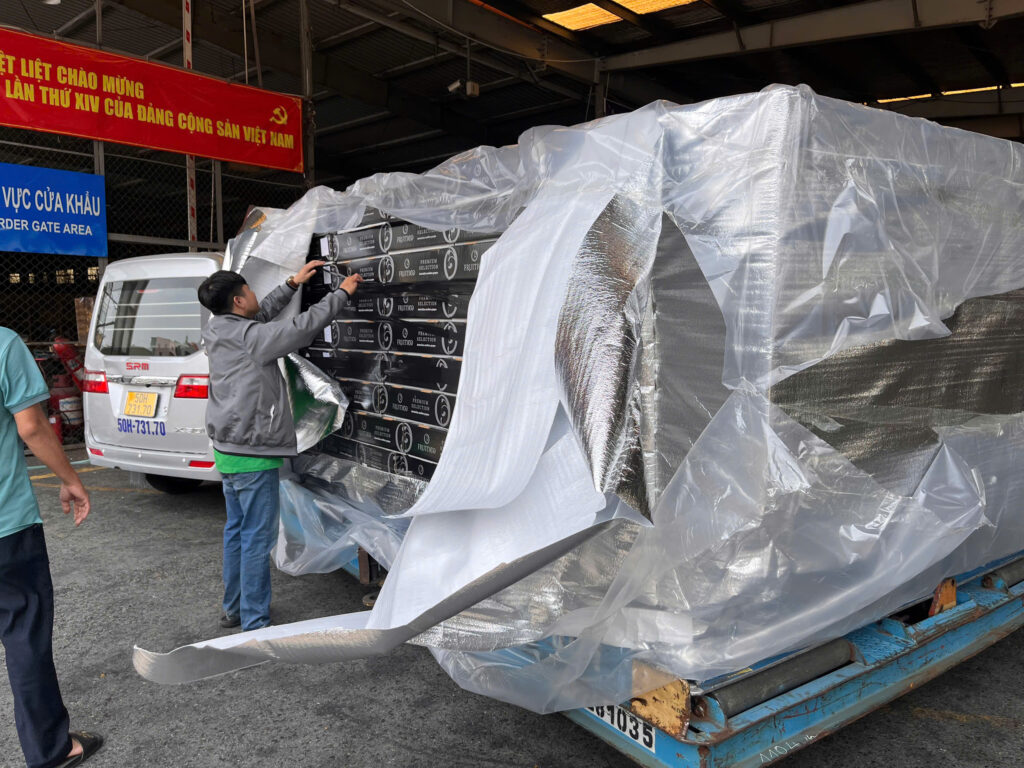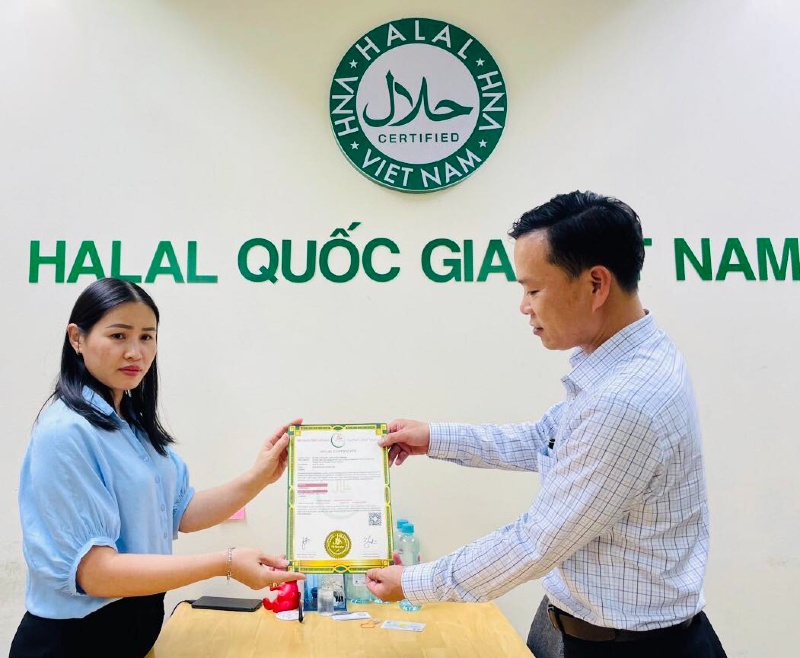What are the benefits and risks for logistics businesses when applying ChatGPT to their business activities? At the same time, what should you keep in mind to be able to use ChatGPT most effectively...?
These issues will be specifically answered by Mr. Nguyen Hoai Chung - CEO of Phaata (Vietnam's first successful International Logistics Exchange based on 4.0 technology platform) in the article below.
– What do you think about the current state of digital transformation in logistics businesses?
Currently, many logistics businesses in Vietnam are also gradually realizing the importance and benefits of digital transformation. According to a survey by the Vietnam Logistics Services Business Association (VLA), up to 87% logistics businesses believe that technology helps create competitive advantages. The number of logistics businesses with technology software applications accounts for about 40-50%. Many logistics businesses are making efforts to apply technology in managing and operating logistics activities. In particular, some large logistics enterprises have invested heavily in digital transformation and deployed many advanced technology solutions such as freight forwarding management system (FMS), customer relationship management system (CRM). , order management system (OMS), warehouse management system (WMS), transportation management system (TMS)…

However, more than 95% of our logistics enterprises are medium, small and micro (SME) in scale. Most of these businesses are facing many difficulties and challenges facing the digital transformation trend. They think that digital transformation is only for large logistics businesses, so they are not interested and still only focus on traditional business activities with a short-term vision. Therefore, in general, digital transformation in the logistics industry in Vietnam is still happening slowly and facing many challenges.
In my opinion, there are many reasons why digital transformation at logistics businesses is slow. One of the main reasons is that businesses' awareness of digital transformation is limited and they do not have a digital transformation strategy and plan consistent with a long-term vision. A culture of reluctance to change, unwillingness to apply new solutions and lack of determination from the leadership are also major obstacles. In addition, there is a lack of qualified human resources to deploy, financial resources, information about digital technology, obstacles in integrating new technology solutions with existing systems and concerns about reliability. Corporate information security... also prevents logistics businesses from digital transformation.
>>> How businesses exploit and use ChatGPT and GPT-4 effectively
– How is ChatGPT application in logistics businesses being implemented, sir?
ChatGPT brings many benefits to logistics businesses. Depending on the different capabilities and needs of each business, its applicability will be at different levels. In my opinion, there are 3 main application groups that logistics businesses can apply ChatGPT to.
In the field of Marketing & Sales, ChatGPT helps create automatic article content such as: writing PR articles, Blogs, articles/advertisements posted on social networks; Translate and create multilingual document content; Compose emails to respond to customers; Prepare content for presentations; Collect customer/competitor information; Research market information; Introducing the services of the auto company; Quick automatic quote 24/7; Collect potential customer information; Data analysis; Generate reports quickly…
For Customer Service, ChatGPT has the ability to help businesses automatically support many customers at the same time; Interact and respond to customers in many different languages; Update shipment information in transit (transportation status, goods temperature, shipment location, expected arrival date...) automatically; Update information on the status of goods/containers being stored in the warehouse/yard automatically 24/7; Support to quickly suggest HS codes for customers; Increase customer experience and service quality…
ChatGPT also supports businesses in implementing internal e-learning training programs for personnel; Internal answers and guidance related to: professional knowledge, processes, instructions, policies, regulations... for employees automatically 24/7.

Mr. Nguyen Hoai Chung discussed at Morning Coffee with HLA about ChatGPT and its application to logistics businesses.
– So, can you provide specific information about the specific benefits and risks when applying ChatGPT to market research, marketing, content, customer care services,...?
ChatGPT brings many practical benefits to logistics businesses such as: Saving time and personnel when creating content for marketing; Automate 24/7 customer service with consistent information; Increase the ability to serve customers in many different languages; Save time collecting information, market research, data analysis, and report creation; Increase customer experience as well as increase customer service quality; Save costs and increase operational efficiency for businesses…
However, besides the benefits, ChatGPT also has limitations and potential risks. Data used to train ChatGPT was taken by Open AI up to September 2021 or earlier. Therefore, the information from ChatGPT may no longer be accurate at the latest time.
ChatGPT currently cannot understand deeply and cannot provide accurate information about the logistics industry, especially in the Vietnamese market. Limited in understanding complex contexts or meaningful questions, ChatGPT only automatically generates content based on the synthesis and analysis of data from multiple sources but does not cite specific sources, thus causing problems. may answer incorrectly or inappropriately. Without senses, emotions, without understanding social behavior, and without experiencing the world like humans, ChatGPT is not capable of interacting practically like real humans, especially not capable of interacting multidimensional.
Logistics businesses need to note these limitations of ChatGPT to avoid potential risks during use.
– To effectively apply ChatGPT to logistics businesses, what factors do you think are needed?
To be able to apply ChatGPT fully, in-depth and effectively, logistics businesses need to pay attention to a number of factors. Specifically, it is necessary to clearly define the purpose of using ChatGPT that the business wants to aim for; Digitize appropriate data according to the needs that businesses want to provide to customers and users. Data in information systems should be updated in real time to best meet customer needs. Connect this business data with ChatGPT and customize the model to suit the logistics industry; ChatGPT training based on connected business data, ensuring ChatGPT's answers are accurate and appropriate to the logistics industry, meeting the standards and requirements of the business; Integrate ChatGPT into systems such as websites or business applications so that customers/users can chat and send support requests to the business as quickly as possible. Business customers/users will have appropriate levels of information access permissions.
Finally, continuously monitor, evaluate and improve ChatGPT to ensure efficiency and accurate responses in specialized fields. Feedback from customers and logistics staff can be collected and used to train and improve ChatGPT more effectively.
– In the future, how will technology affect people, sir?
I think technology is a support tool to help enhance human abilities and performance. Technology can automate simple tasks, but in complex situations and requiring flexibility, creativity and intuition, human participation and decisions are still needed. In addition, humans have special abilities such as the ability to interact socially and be cognitive. These capabilities cannot be replaced by technology.
Technology can change human behavior and ways of working. Some jobs may be replaced by automation and artificial intelligence. However, during this process, many new jobs will also appear with requirements for new skills and new capabilities that people must develop to adapt to the new era.
- Thank you Sir!







